Commentary: Why I Marched
- Share
- Tweet
- Pin
- Share
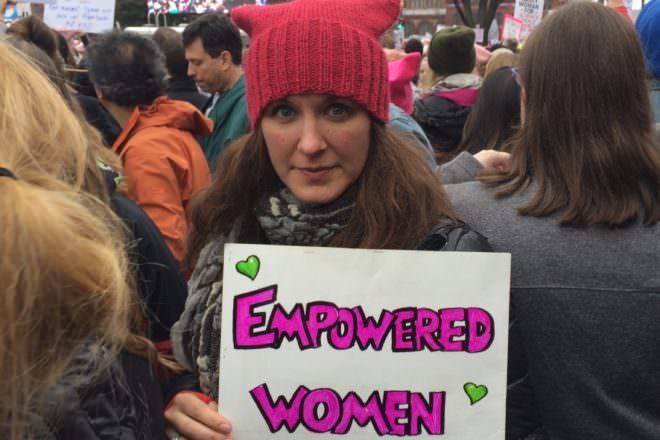
At 10 am last Friday morning, I sat at the back of my dark classroom and listened as a few of my Advanced Placement Literature students presented their Feminist Literary Theory project to their fellow classmates. With an easy and confident command of the content, three young women explained the movement’s multiple waves and demystified terms like “patriarchal biases” and “phallogocentrism.”
In simpler terms, they showed their classmates that feminism did not mean that women are better than men, rather that the genders are equal and our patriarchal society has created the current imbalanced paradigm.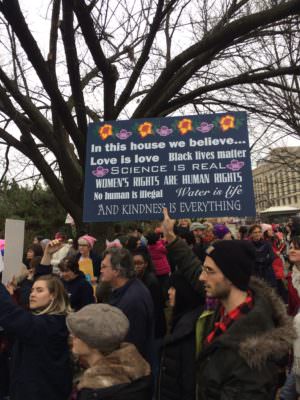
Twelve hours later, I’d be white-knuckling my way across the foggy Pennsylvania Turnpike with a friend and fellow teacher asleep next to me. In an effort to remain alert, I streamed in NPR and listened to political pundits evaluate the tone of our new president’s Inaugural Address and periodically update listeners on unrest and fires in downtown D.C. The relative idiocy and pointlessness of those rioters left me feeling jittery and unsettled, hoping the tone of their window-breaking wouldn’t overshadow our ultimate aim: uniting with other citizens peacefully in support of basic human rights.
As far away from D.C. as South Bend, Indiana, we began seeing buses filled with people. They had signs plastered up against their windows, they wore knit pink hats, they looked exhausted but happy. Like us.
I noticed other travelers watching the crowds and if I had to assess the looks on their faces, I would say they looked equal parts stunned and amused, exasperated and curious.
It made me think about the role I am tasked with playing as an educator, the difficult tightrope I walk of wanting to encourage adolescents to be open-minded and think critically, but to neither thrust my own beliefs upon them or impinge upon theirs. When word got around school that I would be heading to D.C. Friday afternoon, I heard all manner of observations and opinions.
One student questioned the veritable point of “driving 15 hours to stand around with a bunch of women” and another went as far as to spend three days knitting me a pussy hat (the meaning of which she also had to teach me). But in all cases, a respectful conversation began that circled back to the question, “Why are you marching?”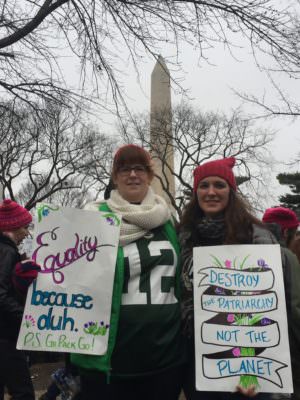
I could boil that answer down to an overly simplified poster motto, like the hundreds I saw this weekend: “Power to the People #whyimarch” or “Silence is Acceptance” or the many that I cannot print here. I could bowdlerize my sentiments into 140 characters of sardonic irony. As a teacher of language I can recognize the power of brevity, but I can also recognize the complexity of my answer is not that simple. It is multi-faceted.
On the broad scope I marched for human rights: more specifically to stand up for those who cannot do it for themselves out of fear or inability. If our nation is to be the shining beacon of hope for the world – to be the city on the hill, the country that is ostensibly synonymous with freedom and justice for all – then I marched for those whose freedoms have been threatened of late. I am fully aware that if had I chosen to stay home, or even to march closer to Door County, my absence would not have altered the outcome of the day. But like voting, imagine if we all thought that way? Who would be there to rise up when others cannot? Margaret Mead said, “Never doubt that a small group of thoughtful, committed citizens can change the world; indeed, it’s the only thing that ever has.” If small groups can change the world, imagine what millions can accomplish.
On the narrow scope, I marched for my 5-year-old daughter. I love my country. I am proud to be an American. While some people may consider protest to be unpatriotic, I would offer that dissent is one of the most patriotic rights we can exercise, granted it is done with passionate peace. And as long as there is real legislation in the works that would grant my daughter fewer rights than I have enjoyed in my life, then I will march. As long as women in this country make 79 percent of what men do, I will march. And as long as sexual assault is trivialized, especially by those in power, I will march.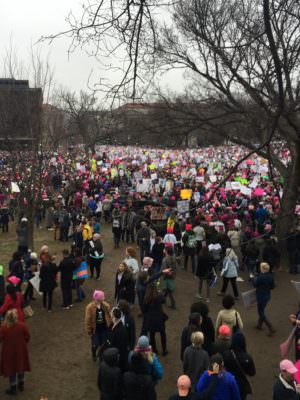
As a teacher, I am humbled daily by the human and private experiences my students choose to share with me and with one another. The collective beauty they have witnessed and the horrific darkness they have been party to is sometimes too much for me to take. I wish I had the power to correct the ills done upon them or the worlds they wake up to every day. I think that is what we sometimes forget when we’re making political decisions and forming opinions about candidates. The ability to empathize. The ability to remember that our experience is not every person’s experience. We all have the choice to cast our vote based on what’s best for us, or what is best for all. While I will not judge someone’s life experience or opinion, I would challenge us to consider what happens when we examine history. If no one stands up for the historically disenfranchised, consider where our nation would be. I was born a privileged, middle-class white woman. But I know, had it not been for others, I would not have gone to college and I would not have been able to cast my votes. With this in my head, the moment of greatest clarity for me came at about 1 pm on Saturday.
We had listened to a litany of celebrities and politicians speak by this time of the day. Some were personal heroes of mine, like Gloria Steinem. Some were new faces for me that I’m sure we’ll hear more from, like newly elected California Senator Kamala Harris.
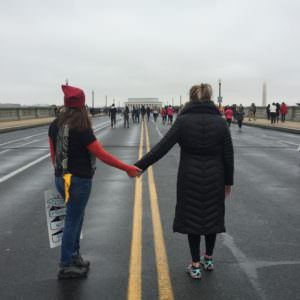 And then there was Sophie Cruz. Do yourself a favor and read up on her if you haven’t heard her name. Sophie is six. She and her little sister were born in the United States, but her parents are Mexican immigrants and will stand to be deported. She stood on that stage in a little red coat with her mother’s arm resting on her shoulder, and her father holding her sister behind her, and slowly and confidently spoke these words first in English and then in Spanish, “Let us fight with love, faith and courage so that our families will not be destroyed. I also want to tell the children not to be afraid, because we are not alone. There are still many people that have their hearts filled with love.” That image will be with me for the rest of my life. Her message was of love, in its purest and truest form.
And then there was Sophie Cruz. Do yourself a favor and read up on her if you haven’t heard her name. Sophie is six. She and her little sister were born in the United States, but her parents are Mexican immigrants and will stand to be deported. She stood on that stage in a little red coat with her mother’s arm resting on her shoulder, and her father holding her sister behind her, and slowly and confidently spoke these words first in English and then in Spanish, “Let us fight with love, faith and courage so that our families will not be destroyed. I also want to tell the children not to be afraid, because we are not alone. There are still many people that have their hearts filled with love.” That image will be with me for the rest of my life. Her message was of love, in its purest and truest form.
To see through the eyes of that 6-year-old American citizen is to see a life experience that is not mine. I do not wake up in the middle of the night worrying the government will take my father away. Nor do I suffer personal racism or religious persecution. But I can stand up for those who do. Because they are just as American as I am, and furthermore, I would argue, that on a fundamental level, our constitution exists more for those who would be targeted for not being lucky enough to be born into privilege.
So as we worked our way back toward the Great Lakes, and listened to the Packers’ Super Bowl hopes slip away, and flipped through the images we all took, I thought about Sophie’s bravery, and the moments of clarity my students offered one another. I thought about signs like “I am no longer accepting the things I cannot change, I am changing the things I cannot accept,” and the simpler, “Peace.” I know that my presence in Washington might not have changed the world, but it changed my tiny one. That’s where we start.
Submitted photos.


